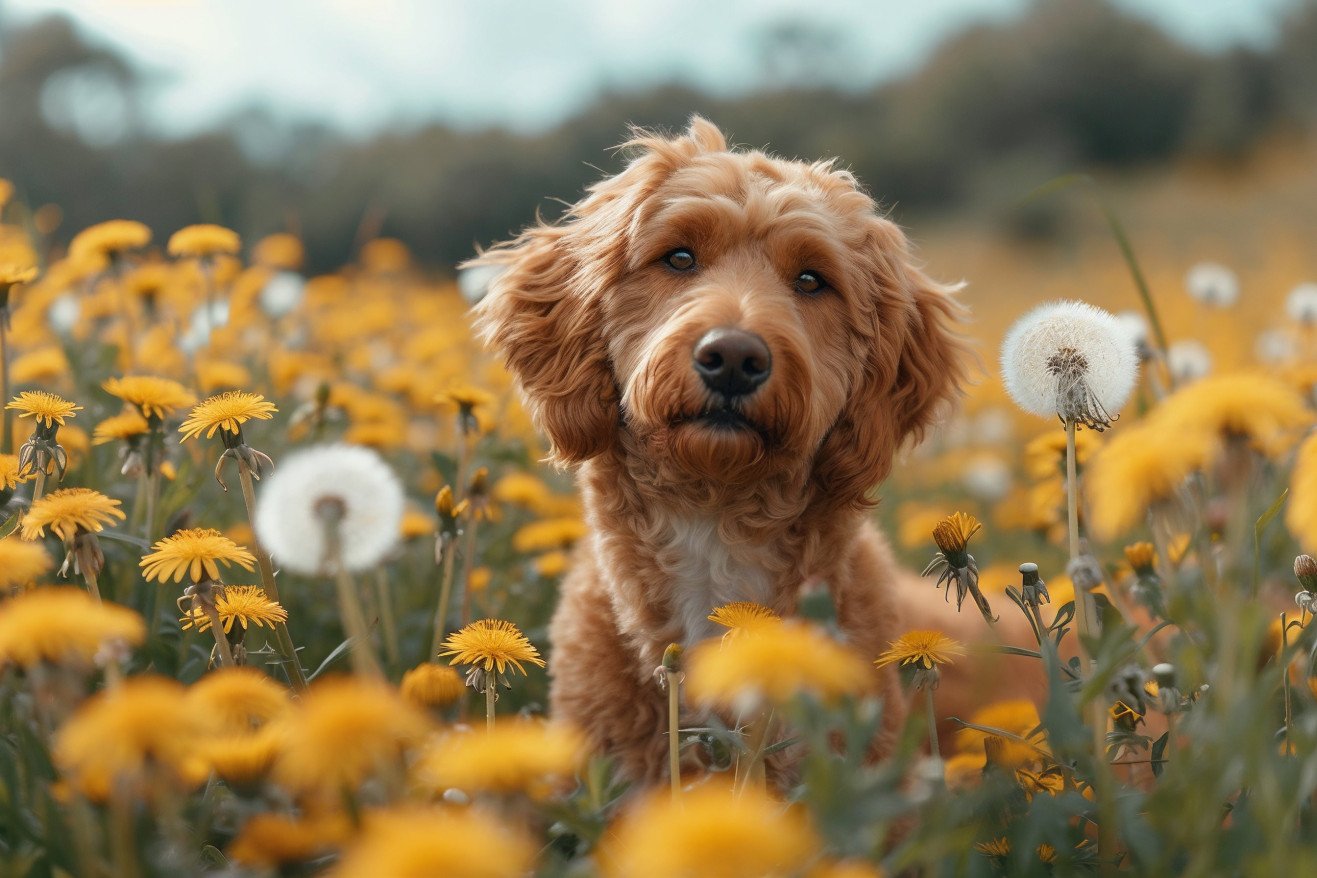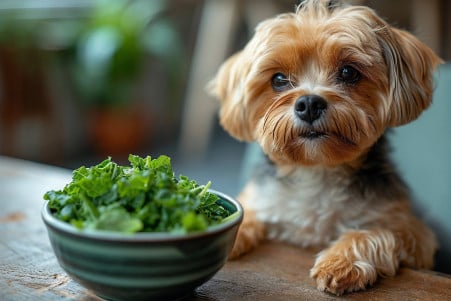Can Dogs Eat Dandelions? Separating Fact From Fiction About Canine Health
9 February 2024 • Updated 8 February 2024

If you’re a dog owner, you may have wondered about the safety of common plants like dandelions. While dogs cannot be poisoned by dandelions, they can eat them, and they are actually quite healthy for your dog.
Dandelions are nutritious, containing vitamins, minerals, and antioxidants potentially beneficial to canine health. However, it is crucial to ensure that dandelions have not been treated with pesticides and to introduce them to your dog’s diet in moderation.
This article will cover a variety of research from veterinary science, toxicology, and botany to provide a comprehensive overview of dandelions and their impact on dogs.
We will also include a nutritional breakdown to help you understand the benefits and make sure you know the importance of finding dandelions that are safe for your dog and the right amount to feed them.
Finally, we will touch on the larger issue of plants that are safe for dogs and the dangers of common plants found in and around your home. By the time you finish, you will have everything you need to know to decide how to handle your dog’s exposure to dandelions and other plants like them.
Can dogs eat dandelions?
Nutritional Value: What Dandelions Can Do for Your Dog
Dandelions are a common weed that grows in many people’s yards, but they are also a rich source of nutrients for dogs. Dandelions are full of vitamins A, C, D, K, and B complex, as well as minerals like iron, potassium, and manganese.
According to A-Z Animals, dandelions are especially valuable because they contain high levels of the B-vitamin complex, as well as vitamins A, C, D, and K, all of which can help with digestion, kidney function, and the immune system.
It is important to make sure you are serving dandelions to your dog in a way that is safe. Both raw and cooked dandelions are safe, but they have different benefits. According to A-Z Animals, which cites WebMD, raw dandelion greens are high in inulin, which can help with gut health. Meanwhile, cooked dandelions are easier for dogs to digest.
It is also important to make sure that you are feeding your dog dandelions in moderation. If your dog eats too many dandelions, it can cause a blockage in their digestive system or an upset stomach.
As with any new food, you should also make sure to introduce dandelions to your dog’s diet slowly and watch for any signs of an allergic reaction. This will help make sure that your dog gets all of the benefits of dandelions without any of the risks.
Beware of the Dandelion: How to Safely Feed Your Dog Dandelions
While dandelions themselves are not toxic to dogs, the dangers of consuming dandelions are mostly associated with environmental toxins like pesticides and herbicides. The herbicide 2,4-D, which is found in many weed and feed products, is even listed as a possible human carcinogen by the International Agency for Research on Cancer, and it could be a carcinogen for dogs if they eat dandelions that have been treated with it.
The National Pesticide Information Center recommends being careful with any plants that may have been treated with these chemicals.
If a dog is allergic to dandelions, they may experience symptoms like itching, swelling, or digestive issues. The Pet Poison Helpline notes that eating too many dandelions can lead to mild stomach upset and increased urination. To avoid these issues, start by feeding your dog small amounts of dandelions and gradually increase the amount while watching for any signs of an allergic reaction.
Make sure to pick dandelions from organic or untreated areas that you know have not been treated with pesticides. This will help ensure that your dog gets the most benefit from this nutrient-dense plant. By being mindful of where dandelions are sourced and how much is consumed, you can protect your dog’s health and take advantage of the plant’s positive effects.
The History of Wellness: Dandelions Throughout Time
The dandelion’s story of healing goes back thousands of years and is deeply rooted in the history of herbal medicine around the world. According to the Post and Courier, the Greeks, Romans, and Chinese all recognized the plant’s healing properties and it has been used in Chinese medicine for over a millennium. This history helped set the stage for the dandelion’s use in both human and animal wellness today.
Throughout history, dandelions have been associated with a variety of meanings, many of which are connected to their health benefits. Even the name dandelion, which comes from the French “Dents de lion,” means “teeth of the lion” and is a nod to the plant’s hardiness and resilience—qualities that have long been valued in traditional medicine for their ability to purify and heal.
While scientific research on dandelions’ historical uses is still in its early stages, there is some evidence to back up the traditional uses of the plant. According to the National Institutes of Health, dandelion flower extract has been found to have anti-inflammatory properties and has been shown to have positive effects on diabetic rats.
At the same time, a report from the University of Maryland Medical Center confirms that dandelions have a long history of being used for medicinal purposes but notes that there is a lack of comprehensive research on the topic.
The history of dandelions’ uses and the early research on their health benefits have helped shape the way people think about the plant’s potential to improve dogs’ health. This history has helped make the case for the use of dandelions to help dogs, but it’s important to remember that it’s just one part of the larger story of how supplements and other wellness practices can help our furry friends.
Understanding the Regulations of Dog Supplements
The market for dog supplements is a bit of a regulatory wild west, with the FDA regulating supplements under the Federal Food, Drug, and Cosmetic Act.
However, unlike human supplements, dog supplements are not regulated under the Dietary Supplement Health and Education Act (DSHEA), which makes the regulatory environment a bit tricky. The American Pet Products Association notes that the FDA considers these products to be unapproved food additives or new animal drugs, depending on the intended use and claims.
As a result, the safety standards for dog supplements are different from those of plants like dandelions. While the FDA requires evidence that a supplement is unsafe before it can take action, it does not require pre-market review for quality, safety, or efficacy. This is in contrast to the general recognition of dandelions as safe, as long as they are pesticide-free and consumed in moderation.
While organizations like the National Animal Supplement Council have established standards to ensure the safety of supplements, including the requirement to report adverse events, the Clinical Nutrition Service at Cummings School notes that the decision to use supplements should be based on the pet’s overall health and diet.
As a result, it’s important to consult a veterinarian before giving your dog any supplements to ensure that you get personalized advice and help navigating the regulatory environment. This will help you make sure that you can safely incorporate supplements or safe plants like dandelions into your pet’s diet.
Knowing the Risks: Toxic Plants and Dog-Safe Dandelions
Knowing what plants are toxic to dogs is important for pet parents who want to make sure their furry friends are safe. According to Blue Cross, many of the most popular garden and houseplants are toxic to dogs, and the symptoms that result from ingesting them can be mild or severe.
For example, lilies, sago palms, and oleander are all well-known for their toxicity and can cause everything from vomiting and diarrhea to kidney failure and heart issues.
Toxic plants are often toxic because they contain substances like calcium oxalate crystals that cause pain and irritation when they come into contact with a dog’s mouth, throat, and stomach.
On the other hand, dandelions are a great example of a plant that is safe for dogs. Unlike toxic plants, dandelions are non-toxic and safe for dogs to eat as long as they haven’t been treated with pesticides, as the ASPCA’s list of non-toxic plants confirms.
It’s important for dog parents to know what plants are toxic to dogs so they can take steps to keep their pets away from them. This can include keeping toxic plants in areas that are inaccessible to dogs, watching dogs closely when they’re outside, and learning to recognize the plants that are toxic to dogs.
Knowing which plants are toxic and which ones are safe like dandelions can help dog parents make sure their pets are safe. If you’re ever in doubt about whether a plant is safe for your dog, always check with your vet or consult resources like the ASPCA’s extensive list of plants that are toxic and non-toxic to dogs.
Dandelions and Dogs: A Healthy and Safe Balance
From the information we’ve covered in our deep dive into dandelions and their impact on dogs, it’s clear that these pesky lawn weeds are not only safe for our pets but can also be quite healthy. Dandelions are packed with vitamins and minerals that can be a great addition to a dog’s diet when used in the right way and in the right amounts.
Just make sure that you’re getting dandelions that haven’t been treated with pesticides to avoid any potential problems. While the ASPCA has confirmed that dandelions are non-toxic, it’s important to make sure that they haven’t been treated with any chemicals that could be harmful and that could negate their natural benefits.
If you’re thinking about giving your dog dandelions, make sure to talk to your vet. Not only can they provide you with the best advice for your dog’s specific health and dietary needs, but they can also give you the peace of mind that you’re doing the right thing as a pet owner.
In the end, dandelions can be a great addition to a dog’s diet if they’re used in a way that’s thoughtful and safe. They’re a good reminder that sometimes the best things for our pets can be found in the most natural and simple ways, and they can even be found in our own backyards.


